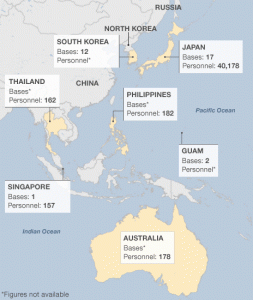China’s Defense Ministry has accused the Pentagon of hyping Chinese military power and inflating the threat it may pose to its neighbors, as ties between the two powers continue to be undermined by Washington’s aggressive postures.
 Chinese Defense Ministry spokesman Geng Yansheng said a just-published Pentagon report on China’s military spending exaggerates Chinese defense capabilities, falsely accuses China of launching cyber-attacks, and amplifies tensions with Taiwan in an effort to boost U.S. weapons sales.
Chinese Defense Ministry spokesman Geng Yansheng said a just-published Pentagon report on China’s military spending exaggerates Chinese defense capabilities, falsely accuses China of launching cyber-attacks, and amplifies tensions with Taiwan in an effort to boost U.S. weapons sales.
“At the time when the relations between the two armies are on the rise, the U.S. stubbornly sticks to ways of casting doubts on and discrediting China,” said Geng. He said China demands that the U.S. “stop making comments not conducive to China-U.S. relations and the mutual trust between the two armies.”
The Obama administration has explicitly initiated what is called a strategic ‘pivot’ to the East to reemphasize a focus on military domination of the Asia-Pacific region, in a broader imperial plan to counter China’s regional influence and unnecessarily provoke China and increase tensions with its neighbors.
To this end, Obama has announced troop deployments to Australia, Singapore and the Philippines. He has also strengthened economic and military ties to South Korea, Japan, Thailand, and Guam, all of whom already have significant U.S. military presence.
This isn’t the first time China has voiced opposition to such U.S. antagonism. In trying to justify the expanded military presence in Asia, President Obama last year said “it’s important for [China] to play by the rules of the road. We will send a clear message to them that we think they may need to be on track, in terms of accepting the rules and responsibilities of being a world power.”
Traditionally, the “rules and responsibilities of being a world power” is to act in a way that is subservient to U.S. power, thus the need for Obama to “send a clear message” of militaristic provocation to the Chinese that their growing influence in recent years are American prerogatives.
China responded negatively, yet politely, to the news. “It may not be quite appropriate to intensify and expand military alliances and may not be in the interest of countries within this region,” said Liu Weimin, a Foreign Ministry spokesman.
Former national security adviser to President Jimmy Carter Zbigniew Brzezinski has also described Obama’s approach as overly confrontational. As he told Slate in January, “to define our engagements in the east in terms of China is a mistake. We have to focus on Asia but not in a manner that plays on everyone’s anxieties … It becomes very easy to demonise China and they will then demonise us in return. Is that what we want?”


